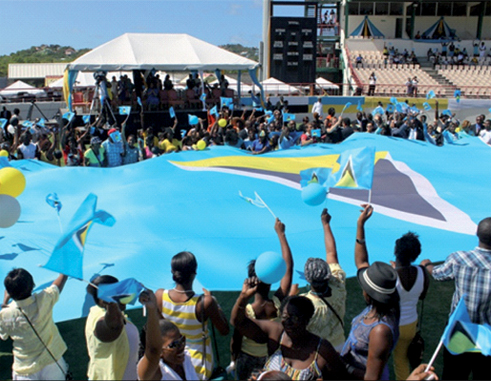FORTY years ago, the people of Saint Lucia decided to dissolve the political bands that connected them with Great Britain and assume the responsibility of charting their own future. It was a bold move on the part of the country’s forefathers back then as Saint Lucia, at the time, had no particular asset on which it could rely for economic growth except a determination to succeed and the benevolence of its once colonial rulers by providing it with preferential treatment and aid in almost every sector of its economy.
Overtime we have seen that benevolence diminished to the point where Saint Lucia is literally on its own jostling with other countries of the world for deals and friendships that would determine its progress or lack thereof. The question is: Has Saint Lucia, with the power Independence has placed in its hands and in its fortieth year of forging its own development, done an adequately competent job in developing itself, 40 years after cutting its umbilical cord from Britain?
Or has this dawning of a new day on 22 February, 1979 failed in its intentions to really bring out a new brightness making things better for our people, 40 years later?
An honest look at key areas affecting the lives of Saint Lucians today should provide the best answer to these questions.
First let’s look at the political arena. There is no doubt that the country is experiencing a political divide, one that is so stark that in old, new and social media it is easily discerned. We, as a people have yet to bridge that divide which continues to weaken us instead of making us stronger, caused disruption in our efforts at progress and pits citizen against citizen, even members of families against other members of the same family, in ways that have impacted negatively on national development.
Forty years after gaining independence we are still fraught with problems in our health and education systems, still struggling to ensure that important institutions like those charged with maintaining law and order and keeping the fabric of our society intact are not crumbling all around us.
After four decades of independence we still, it seems, are unable to steer our economy on an even keel, not with a mushrooming national debt, a stubborn unemployment rate that lowers marginally year after year but still finds itself, after 40 years, hovering around the 20 percent mark, a weak agricultural export outlook, a high crime rate with murder a major feature in that scenario, disagreement on a future path of sustainability by our respected political parties and the list goes on.
But even as we look at the horrors around us and sigh that as a 40 – year – old country we should have done better in certain areas, this does not mean that celebration of some sort is not in order. Patriotism and love of country should be things worthy of celebration.
Also worthy of celebration is the fact that we are still a nation of laws and still in more control of our destiny than some other countries under the iron fist of international organizations, like the IMF, or despots whose only ambition is to remain in power.
Perhaps, at age forty, we should reflect on whether the concept of independence is a pure concept or whether the reality of physical size, economic resource and, most importantly, educational levels are the real determinants of the relative level of independence we can aspire to; do we reduce our potential by splitting the country in half along party lines; have we sacrificed the goal of social advancement on the altar of personal economic greed. We tout our independence, but the corollary of independence is that no one owes us anything. Whilst we celebrate, let us also reflect that we are one nation and one people. This 238 square miles is ours – to develop or despoil.













